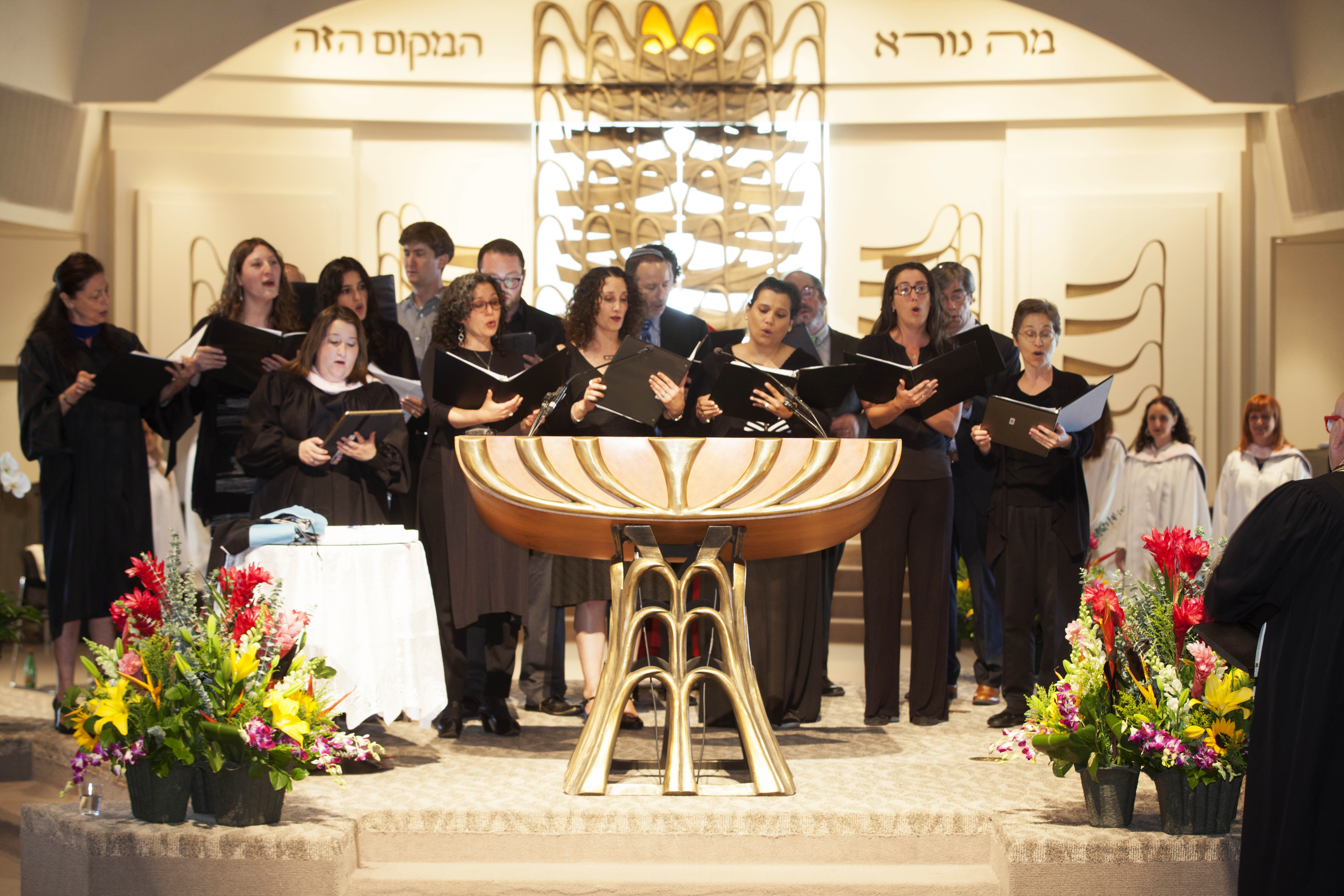
The graduation choir performs during a 2018 graduation for the Academy for Jewish Religion California. Photo courtesy of the Academy for Jewish Religion California. (Photo by Religious News Service)
The Academy for Jewish Religion California has rented space in several locations during its 21-year existence as a transdenominational seminary that trains rabbis and cantors.
For a while it was housed in an office building in downtown Los Angeles, then at Hillel, the Jewish campus organization at the University of California Los Angeles.
But beginning Oct. 1, in an arrangement both novel and pathbreaking, the academy will move to Loyola Marymount University, a private Catholic school founded by the Jesuit and Marymount orders.
The move is not merely envisioned as a rental contract for three offices and four classrooms, though a three-year lease has been signed. The idea is to allow for some joint classes as well as other collaborations. LMU students in theology might take a Hebrew class at the academy, while academy students might take an elective in the New Testament through LMU’s theology department. (LMU does not have a seminary.)
Down the road, a joint degree in interfaith relations or a center for interfaith understanding, or both, are being considered.
"We have only begun to imagine together," said Robbin D. Crabtree, dean of LMU’s Bellarmine College of Liberal Arts.
Classes this semester are online-only for the rabbinical school, but students are expected to be in person beginning in January.
Theological schools of all faiths have been under increasing pressure to consolidate, merge or close, as enrollments decline and institutional support shrinks. But few have taken up interfaith collaborations. For that reason, the partnership between a rabbinical school and a Catholic university will likely be closely watched.
“There was a practical need and a philosophical proximity,” said Rabbi Mel Gottlieb, president of the Academy for Jewish Religion California.
“We have a program that has a strong commitment to learning about all religions at a time in our culture when there’s a lot of strife,” he added. “The Jesuits have a commitment to social action. We felt there was an affinity there.”
Advertisement
Since 2008, LMU has had a Jewish studies minor for undergraduates that enrolls up to 30 students each year. For more than a decade, the university has observed two annual commemorations, one for Kristallnacht, the 1938 attack in which Germany’s Nazi Party torched synagogues and vandalized Jewish businesses and homes, and one for Yom HaShoah, a day of remembrance for the 6 million who died in the Holocaust. The university also runs a monthly Jewish book club.
Only about half of LMU’s 6,500 students are Catholic; its Jewish students comprise between 2% and 4% of the student body.
“Our academic offerings and student life programming all presume religious plurality and value interfaith work and the spiritual development of all of our students — even the so-called nones, who are often still spiritual seekers even without formal religious affiliations,” said Crabtree.
The first course to be cross-listed between the university and the academy will be a class on Jewish adaptation and resilience planned for 2022, said Holli Levitsky, director of the Jewish Studies Program at LMU.
The academy is one of three rabbinical schools in California. It has graduated 190 rabbis, cantors and chaplains. The academy also offers a master’s degree in Jewish studies.
Among its graduates are Rabbi Susan Goldberg, who leads Nefesh, an independent Los Angeles synagogue, and Rabbi Lori Shapiro, founder of Open Temple, a transdenominational congregation in Venice, California.
“The Academy for Jewish Religion is very focused on how to prepare our rabbis to broaden the tent so we bring in Jews who are unaffiliated,” said Marlene Canter, who chairs the academy’s board of directors. “There’s a lot of the same thing happening in Catholicism. There are a lot of people interested in interfaith dynamics. How do we create a more loving, kinder world through our religions?”
The Rev. Allan Figueroa Deck, a Jesuit priest who serves on the committee that approved the academy’s move to the university, said LMU has a long-standing relationship with the larger Los Angeles Jewish community, the second-largest in the U.S. after New York. That history stretches back to the 1930s, when its law school began admitting Jews at a time when other law schools did not.
In the 1950s, LMU started the Martin Gang Institute for Intergroup Relations, named after the famous Jewish lawyer who helped dissolve the Hollywood blacklist that denied employment to people who were believed to be Communists or sympathizers.
“We are encouraged to foment relations with all religions," Deck said on behalf of the university. “But we have a special interest in our relationship with the Jewish people because of the relationship of the Jewish religion and the foundational role it plays in the development of Christianity.”







